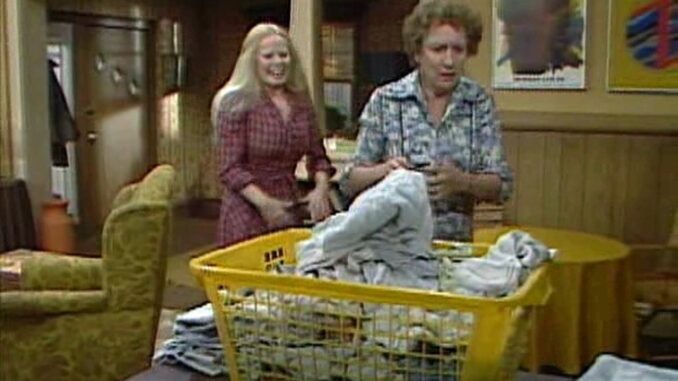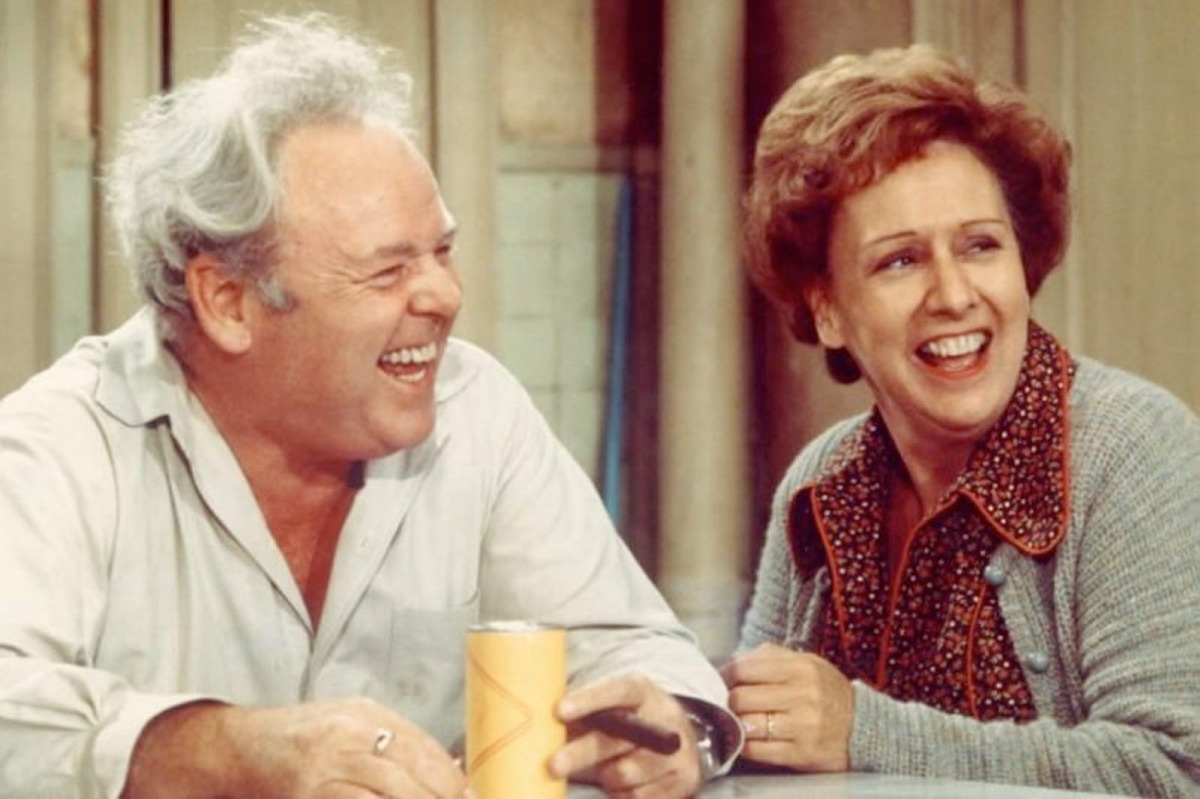
 All in the Family creator Norman Lear takes fans behind the scenes of the groundbreaking sitcom on the occasion of its 50th anniversary.
All in the Family creator Norman Lear takes fans behind the scenes of the groundbreaking sitcom on the occasion of its 50th anniversary.
The face of television was changed forever in 1971 with the premiere of All in the Family. The working-class Bunker family of Queens, New York—lovable bigot Archie (Carroll O’Connor), his long-suffering “dingbat” wife Edith (Jean Stapleton), their liberal daughter Gloria (Sally Struthers), and son-in-law Mike “Meathead” Stivic (Rob Reiner)—instantly became, and half a century later still are, four of the most iconic characters in television.
In All in the Family: The Show that Changed Television, Norman Lear shares his take on fifty essential episodes that exemplify why the show remains as funny and relevant as ever. Its boundary-pushing approach to hot-button topics is examined with commentary from co-stars O’ Connor, Stapleton, Reiner, and Struthers, as well as writers, directors, and guest stars from the show. With previously unseen notes from Lear, script pages, production designs, and a foreword by super-fan Jimmy Kimmel, this book is the ultimate companion to the seminal series and a must for fans of Lear’s shows and television comedy. “Norman Lear,” said New Yorker critic Michael Arlen, “has a feel for what people want to see before they know they want to see it.” All in the Family, like all of the Lear shows that followed, was a turning point in television’s handling of taboo subjects such as race relations, feminism, homosexuality, war, religion, gun control, social inequity, and other controversial subjects, all of which remain in the news today.
About The Author
Producer, philanthropist, and activist Norman Lear has the distinction of being among the first seven television pioneers inducted into the Television Academy Hall of Fame. He won his first two Emmy® Awards in 1971 (for All in the Family’s premiere season) and his most recent one in 2020, for Live in Front of a Studio Audience: ”All In The Family” and ”Good Times.” His memoir, Even This I Get to Experience, was published in 2014. Jimmy Kimmel is the host and executive producer of the Emmy® Award–nominated Jimmy Kimmel Live!, ABC’s longest-running late-night talk show. Also a comedian and writer, he has hosted some of the biggest events in pop culture, including the Academy Awards, the Emmys, the American Music Awards, and the ESPY Awards, as well as executive-produced and hosted the Emmy Award–winning Live In Front Of A Studio Audience: “All In The Family” and “The Jeffersons” and Live in Front of a Studio Audience: “All In The Family” and “Good Times.”
The Birth of a Television Revolution
All in the Family didn’t just entertain—it challenged, confronted, and reshaped what American TV could be. Premiering in 1971, the show introduced viewers to the Bunker family, where social issues walked right into your living room and refused to leave quietly.
With its bold themes, groundbreaking dialogue, and raw honesty, All in the Family didn’t just break the mold—it shattered it.
What Made All in the Family So Groundbreaking?
It Talked About the “Taboo”
Before All in the Family, TV sitcoms tiptoed around race, politics, religion, and sexuality. This show kicked the door down. Topics like:
-
Racism
-
Feminism
-
Homophobia
-
The Vietnam War
-
Abortion
… were not only discussed, but argued over—loudly—right at the Bunker dinner table.
Archie Bunker—the Flawed Everyman
Played masterfully by Carroll O’Connor, Archie was bigoted, loud, and shockingly relatable. He said what many were thinking (or were afraid to admit). The genius? You didn’t have to agree with him. In fact, you weren’t supposed to. That contrast drove conversations in living rooms across America.
Meet the Characters Who Made TV History
Edith Bunker – The Heart of the Home
Jean Stapleton brought warmth and quiet strength to Edith. Often dismissed by Archie, she quietly challenged his views and showed more progressive empathy than her husband ever could.
Gloria and Michael – The New Generation
Sally Struthers and Rob Reiner played Archie’s liberal daughter and her hippie husband, the infamous “Meathead.” They clashed with Archie weekly, representing the cultural war between old-school conservatism and the younger generation’s push for change.
How All in the Family Changed the Television Landscape
A Sitcom That Sparked Debate
This wasn’t a show you passively watched. You discussed it. You argued about it at work the next day. It made America talk about the things it avoided.
It Redefined What Comedy Could Do
Up until this show, comedy was escapism. But Norman Lear, the creator, made sure laughter could also mean introspection. It was the first major series where the audience could laugh and cringe in the same breath.
The Rise of the Socially Conscious Sitcom
Shows like Maude, Good Times, and The Jeffersons—all spin-offs—owe their existence to All in the Family. It opened the floodgates for more daring, diverse, and issue-driven storytelling.
Awards, Accolades & Cultural Impact
Critical Acclaim
-
22 Emmy Awards
-
4 Golden Globes
-
Ranked #4 on TV Guide’s Greatest TV Shows of All Time
These weren’t just trophies—they were proof that smart, challenging television had a place on prime time.
The Smithsonian Couch
Yes, that couch. Archie and Edith’s worn-out armchair set now lives at the Smithsonian, proving its place not just in TV history—but American history.
Audience Reaction—Love, Hate, and Everything in Between
A Polarizing Force
Archie Bunker became both beloved and despised. Some viewers saw him as a hero. Others as a villain. The truth? He was a mirror, reflecting America’s uncomfortable truths.
Ratings Rocket
The show was #1 in the Nielsen ratings for five straight years. Even as it ruffled feathers, it pulled in massive audiences—people couldn’t look away.
Why It Still Feels So Relevant Today
The More Things Change…
Race, politics, generational conflict—sound familiar? All in the Family might be 50+ years old, but its themes still hit home today.
Comedy with a Conscience
Shows like The Office, Black-ish, and The Conners owe a debt to All in the Family. Without Archie Bunker, we might not have the bold TV voices we know and love today.
Behind the Scenes – Fascinating Facts You Never Knew
The Show Was Almost Canceled After Its First Season
Early ratings were disappointing, but CBS took a chance. That gamble paid off big time.
Carroll O’Connor Nearly Quit
Disagreements with producers over pay and creative direction almost cost the show its lead star—more than once.
It Wasn’t Always Called All in the Family
The original title? “Justice for All.” Imagine how different that would’ve felt.
Could All in the Family Exist Today?
Yes—and No
In today’s cancel-culture climate, Archie’s language would cause uproar. But the core idea—a show that holds a mirror up to society—is needed more than ever.
Modern Remakes & Tributes
In 2019, Jimmy Kimmel produced a live remake of an original episode starring Woody Harrelson and Marisa Tomei. It proved the format still works—because the issues haven’t gone away.
Norman Lear’s Vision: TV as a Catalyst
Lear once said he didn’t want to make “message” shows—he wanted to make “people shows.” And that’s exactly what All in the Family was. It wasn’t preachy—it was provocative, personal, and painfully real.
The Legacy Lives On
From reruns to academic analysis, All in the Family remains a cultural touchstone. It’s taught in media studies classes. It’s referenced in political discussions. And it’s proof that TV can be more than just entertainment—it can be education.
Conclusion: The Show That Made America Look in the Mirror
All in the Family wasn’t comfortable, and it wasn’t meant to be. It was bold, messy, honest, and deeply human. And that’s what made it so powerful.
Whether you loved Archie or loathed him, you felt something. And for a sitcom to pull that off? That’s nothing short of revolutionary.
As television continues to evolve, we owe it to shows like All in the Family—because they had the courage to say what others wouldn’t, and made us listen.
